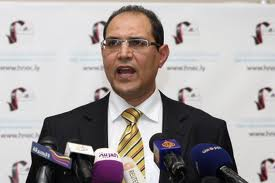On the evening of Tuesday 17 July the head of the Higher
National Election Commission (HNEC), Nouri al-Abbar, announced
the result of the election for the 80 seats in the 200 seat National Congress
which are reserved for political party lists. As had been widely leaked the
liberal secular National Forces Alliance (NFA), which is a
grouping of more than 60 individual parties and hundreds of local civil-society
organisations that is led by Libya's first post revolution prime minister,
Mahmoud Jabril, won 39, or 62%, of the 80 seats. The NFA came first in ten of
the thirteen electoral districts and another liberal party came first in
another. The alliance did surprisingly well even in towns such as Derna which
has traditionally been an Islamist stronghold.
By contrast the Muslim Brotherhood's
Justice and Construction Party (JCP), which was expected by
many to do well because of its disciplined organisational and financial muscle,
only won 17 seats. The remaining 24 seats were won by 19 different parties.
Nouri al-Abbar also confirmed the large turnout with 61% of
eligible men and 39% of women having voted. Of the total 1.8 million votes only
3% were invalidated which is very encouraging given that it was Libya's first
election for half a century. There will now be a 14 day period for appeals
including ten days for the decisions to be reviewed by the appeals court.
While there is no doubt that these results are encouraging for
the liberals the results for the independents candidates contesting the
remaining 120 seats have not yet been announced and, only when they are, will
the real balance of power between the main political group in the National
Congress be determined.
Almost regardless of the actual results, the fact that Libya
succeeded in conducting seemingly free and fair democratic elections, with only
a week's delay and with minimal violence or disruption, is a spectacular
achievement which has been recognised by the country's main western
partners.
© 2012 Menas Associates

No comments:
Post a Comment